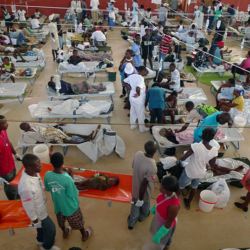
Last October, following the UN General Assembly, we wrote of the urgency needed for the global health crisis occurring in Haiti. At that time, the former Secretary-General, Ban Ki-moon, admitted the role of the UN in starting the cholera epidemic in Haiti in 2010 and spoke directly about the need for a new strategy to aid the country.
He said, “A new strategy is needed to alleviate their distress and improve their living conditions. We are firmly resolved to fulfill this moral responsibility.” he said, “Later, I will give you details on this strategy. Let us work together to meet our obligations to the Haitian people.”
And, like a fool, I believed him.
What I did not realize is that he was a magician with a card trick. He was talking about providing the details of the strategy instead of talking about the issue at hand – who is going to pay for it.
An effective strategy has been crafted by experts in the field. It consists of 1) “rapid response” or the ability to detect outbreaks as soon as they happen by tracking each new case in the community 2) effective treatment of cholera patients, requiring sustained funding for nurses and clinics 3) vaccinating a subset of Haiti’s 10 million people (2.5 million) in strategic locations 4) resources to increase and maintain access to safe and clean drinking water, most urgently in urban areas such as Mirebelais, where outbreaks are more likely and more common.
The problem is that this effective plan does not come cheap – in fact, it costs at least $180 million to implement it.
And, it is now falling on the new Secretary General of the UN, Antonio Guterres, to make this plan happen. But, he is not succeeding. He is getting almost zero support – literally.
After a smattering of pledges of support having been received from South Korea, France, Liechtenstein, India and Chile, totaling less than $2 million (Canada and Japan have separately granted about $7 million to help Haiti,) Guterres wrote to the 193 member-states last month in an appeal for support for Haiti.
One country responded – Britain – pledging $622,000.
Guterres says that he will look for other solutions, now that the response is not adequate, but, it is unclear what avenues may be pursued.
In summary, last September, the UN said that they would mobilize this money. David Nabarro, the UN’s special adviser on sustainable development said that they would provide $181 million over three years and “at least the same amount” for the families of victims.
Now the UN cannot raise more than 10 million…?
Well, that’s not enough. But, as we said almost six months ago, when you break something in a store, you have to buy it — whether you can afford it or not. There are innocent people, many of them children, dying of a disease that is the result of the U.N.’s irresponsibility and negligence. And, the cholera crisis in particular is not slowing down. There have been almost 2000 cases of cholera reported since the beginning of 2017.
The UN is responsible for this nightmare and they should be held accountable. Although we said last fall that they cannot wait one more day, it looks like the people of Haiti, who are suffering terribly, are going to have to wait until the money is raised – however long that make take.